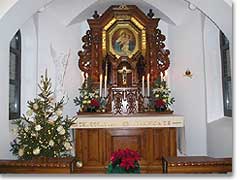 |
||
"The yes of the promises has arrived.
The Covenant is fulfilled,
the Eternal Word from heaven
unites with our weak human nature..."
ROME: - by Fr. Alberto Eronti. Walking to St. Peter's Square the week before Christmas: The low clouds threatened rain, there were few people in the streets. At St. Peter's Square the workers were busy finishing the Vatican manger. I asked myself if was just imagining it, or whether there really were less people and euphoria in the streets. The news reports do not create joy, and there are definitely no signs of hope in TV news or in the papers. The criminal records, the economic situation which is not very encouraging, and the all but uplifting prognostics of the situation in the Middle East, penetrate the mood of the public and depress it. Was that enough to explain the atmosphere around me? No, it is not. The problem has yet deeper reasons. No matter how much some may deny it, Italy cannot escape the general tendency of "new Europe".
Foto de arriba: Pesebre vivo en el Santuario de La Loma, Paraná, Argentina Photo above: Living Manger in the Shrine in La Loma, Paraná, Argentina Bild oben: Lebendige Krippe beim Heiligtum in La Loma, Paraná, Argentinien Foto: Ríos © 2004 |
|
 |
|
Belén Santuario del Hogar Home Bethlehem Shrine Bethlehem Hausheiligtum Foto: Lavini © 2004 |
|
 |
|
El Santuario de Belmonte, Navidad 2004 The Shrine in Belmonte, Christmas 2004 Das Heiligtum in Belmonte, Weihnachten 2004 Foto: Abram © 2004 |
|
|
Europe facing a civilization crisis
Europe is experiencing a spiritual crisis that represents a break with its history and raises the question of its identity. Europe is facing a "crisis of civilization", a cultural crisis, a crisis that affects its roots, and its history. The majority of the inhabitants of Europe are less and less able to answer the question: From where do I come? Denying its roots, Europe denies and it forgets its history; it does not know "how it came to be", nor does it know of the forces that gave rise to it. So it should not surprise us that it is also asks: "Who am I" and "where am I going"? Europe increasingly seems unable to answer these existential questions. The sense of being at home, of national identity is being lost. It is remarkable that Mr. Ciampi, President of Italy, constantly refers to being Italian, stressing Italian identity, national pride. The old fighter and man of ideals sees that the roots of our being are affected.
This "new Europe" has coined the sociological expression: "postchristian"; it lives what George Weigel, North American lay theologian and historian, defines as "Cristophobia". In addition the western part of Europe lives in "a population winter", a decrease in the birth rate, that resembles a kind of "collective suicide". We need only remember that Italian families of couples under 40 have an average of 2.6 members. It does not reach three! In the midst of this reality there is another, increasing symptom of the "disease that plagues the West today": the systematic attack on religious signs and symbols in public places, a tendency that affects Jews, Muslims and Christians almost equally.
The value and the sense of the manger
Against this background the Catholic Church and the Christian world are preparing to celebrate Christmas 2004. In the context of what has been said, it is interesting that on December 12, the third Advent Sunday, in his words after the Angelus, the Pope vindicated the value and the sense of the manger. In St Peter’s Square hundreds of children and adults held up a "Baby Jesus" for the Holy Father to bless at the end of the Marian prayer. Those Baby Jesus’ will be placed in the home mangers on Christmas Eve. He spoke with a tired and anxious voice: "The manger constitutes a representation of familiar Christmas scenes, and is for that reason singularly expressive".
Your Shrine is our Bethlehem ... our manger
All this made me think again and again of the mission that Father Kentenich gave to the Schoenstatt Family Movement and the central and determining role of the home shrine. The times are not easy, but far from worrying, we must occupy ourselves. We have to supply the antidote, the answer, to the exciting challenge. Difficulties are supposed to be signs from Providence. Even if many hearts are closed, we have to keep ours open, as Mary and Joseph did in Nazareth and Bethlehem; as our father and founder did in the difficult times of his life. If God had to look for a place to be born today, if he wants to be born again all the time, he must look for "places". These places are our shrines - the home shrines, our heart shrines, each of the communities and groups that make up our Schoenstatt Family.
This is how we will be able "to help" to Mary in her mission, which so motivated our father and founder: "to let Christ be born again in our time". This is how we can collaborate with the Church and our father as his "allies", to give back to the West its root and its reason for existence. With our founder we turn to Mary, the Mother Thrice Admirable, and we say with hopeful faith the same prayer that Father Kentenich said in his "difficult times of Dachau": Mary, your shrine is our Bethlehem...
English Edition: Mary Cole, Manchester, England